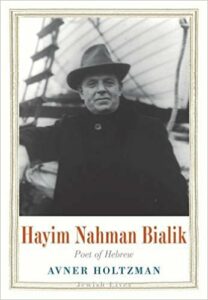Hayim Bialik: Poet and Collector of Legends
June 2, 2017 in Library Corner
By Robin Jacobson.
 If you’re ever in Tel Aviv, consider a visit to the home of Hayim Bialik (1873-1934), revered as Israel’s “National Poet.” Minna, my Tel Aviv-residing daughter, introduced me to Beit Bialik on a personal tour of “her city.” The house is an enchanting mix of Middle Eastern and European styles, a romantic setting for a writer. The irony is that Bialik seldom wrote in this house; he was too overwhelmed by visits from admirers and advice-seekers. Read about Bialik in a worthwhile new biography, Hayim Nahman Bialik: Poet of Hebrew by Avner Holtzman, a professor of Hebrew Literature at Tel Aviv University. Here is an overview:
If you’re ever in Tel Aviv, consider a visit to the home of Hayim Bialik (1873-1934), revered as Israel’s “National Poet.” Minna, my Tel Aviv-residing daughter, introduced me to Beit Bialik on a personal tour of “her city.” The house is an enchanting mix of Middle Eastern and European styles, a romantic setting for a writer. The irony is that Bialik seldom wrote in this house; he was too overwhelmed by visits from admirers and advice-seekers. Read about Bialik in a worthwhile new biography, Hayim Nahman Bialik: Poet of Hebrew by Avner Holtzman, a professor of Hebrew Literature at Tel Aviv University. Here is an overview:
The Making of a Poet
When Hayim Bialik was a lonely boy growing up in the Ukrainian city of Zhitomir, no one could have guessed that he would become a Zionist hero. Yet when he died, 100,000 people joined his funeral procession in Tel Aviv, where he lived for his last decade. Professor Holtzman traces the trajectory of Bialik’s improbable life.
Bialik’s father, an unsuccessful lumber merchant, died when Bialik was seven. Unable to support her children, Bialik’s mother sent him to live with her husband’s father, an austere, religious man. Bialik grew up without much affection or attention. His only education was in traditional Jewish texts. A gifted student, he left home at age 17 for a famous yeshiva in Lithuania.
There, Bialik’s world expanded. He joined a Zionist organization; he began reading secular books and writing Hebrew essays and poems. Frustrated with yeshiva studies, Bialik fled to Odessa, a vibrant hub for Zionism and Hebrew literature, where his first poem was published. Still, he felt obliged to return to Zhitomir; his grandfather arranged a marriage, and Bialik set to work as a lumber merchant, like his late father and new father-in-law. Surprisingly, this career nurtured his poetry. Except for Shabbat, Bialik lived alone in the forest, which gave him time for writing.
A Voice for Zionism
Bialik’s lumber business failed, and he became a Hebrew teacher, eventually moving back to Odessa. In 1901, he published his first volume of poems to critical acclaim. But Bialik’s true breakthrough came after a Jewish fact-finding committee commissioned him to investigate the 1903 Kishinev pogrom.
Instead of a report, Bialik penned a searing poem, In the City of the Slaughter, which denounced the victims for letting the slaughter happen. Stunned, Russian Jews began forming self-defense groups. Another Bialik poem, The Dead of the Wilderness, based on a Talmudic legend about the Israelite generation that died in the desert, gave Zionists a rallying cry, “We are the last generation of enslavement, the first generation of freedom.” Bialik was now the poet-prophet of Zionism, although his poetry actually encompassed a range of topics.
A Collector of Legends
Besides poetry, Bialik wrote fiction and essays, and he was also a publisher, children’s author, literary translator, and editor. One classic work is the Sefer Ha-Aggadah (Book of Legends), a massive anthology of the legends and lore of the Talmud and Midrash edited by Bialik and his longtime collaborator, Yehoshua Ravnitzky. They devoted years to gathering and organizing this material, which they lyrically described as “a beautiful palace” in which “the spirit and soul of the Jews permanently dwelled.”
For Bialik, preserving Judaism’s rich civilization was essential. Speaking at the opening of Hebrew University in 1925, Bialik exhorted Jews to build their university on the “sound and beautiful stones” of Judaism’s ancient heritage: “Let not the builders reject these stones…May those stones not be forgotten!”